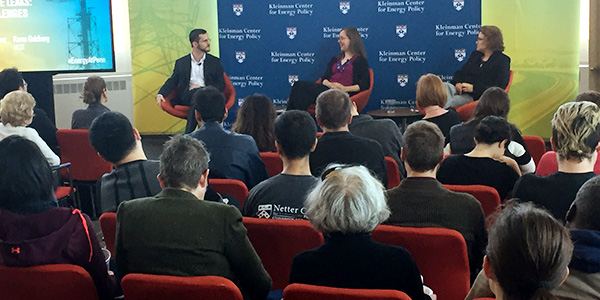By Rory D. Sweeney
PHILADELPHIA — Fugitive methane emissions might be reduced throughout the natural gas supply chain by making accidental leaks and routine venting part of the carbon markets being considered for the power industry, panelists told attendees Wednesday at a policy forum hosted by The Kleinman Center for Energy Policy at the University of Pennsylvania.
The key would be developing a market that taxes emitters but also pays those who capture emissions, as the technologies would also be useful for reducing methane emitted by nature — either as part of natural processes or negative feedback loops exacerbated by global climate change.
“If you can price greenhouse gas emissions and you put in that financial incentive for capturing it, and then whatever brilliant technology gets developed, it faces the right incentives and it has a financial ability to move forward,” said Catherine Hausman, an assistant professor of public policy at the University of Michigan. “The carbon tax, the flip of that is the subsidy or whatever for what gets captured.”
She suggested a policy, which she acknowledged has legal concerns, where every potential source of methane in a region would be responsible for a share of the area’s emissions unless it can prove it wasn’t the source. That would incentivize gas producers and pipelines to monitor their operations to prove themselves innocent.
The panelists weren’t afraid to promote increased governmental regulation.
“Tax the emission if you can. Absent a tax … you need regulations on the way they run. … I am totally happy with regulatory measures that are not market-based in situations where you can’t develop market-based solutions,” Hausman said. “I always teach that zero pollution is not the right answer because it stops all economic activity. Now, very aggressive action is certainly needed.”
“I would love to get to the place where methane emissions from the oil and gas industry are appropriately taxed. … Our view is we’re not there yet,” the Environmental Defense Fund’s Ben Ratner said. “Where we really want to get to over time is prevention. … There’s just no way around government action.”

From left, Environmental Defense Fund’s Ben Ratner, Catherine Hausman, assistant professor of public policy at the University of Michigan, and moderator Karen Goldberg, a chemistry professor at the University of Pennsylvania and the director of the Vagelos Institute for Energy Science and Technology. | (c) RTO Insider
Another challenge for developing a carbon market will be defining what values are used to determine payments. As hard as it is to nail down a valuation of carbon — the panelists noted suggestions from $40 to $400/ton — so too is calculating the amounts emitted. And while researchers can estimate global emissions, “knowing the precise location [of the source] is what’s hard,” Hausman said.
“You have to solve the measurement problem,” she said.
“There’s still so much uncertainty about global emissions … that we don’t know yet what [each source’s emissions limit] should be,” Ratner said.
Hausman suggested the key might be locating “super-emitters.”
The panelists also criticized the Trump administration for attempting to reverse regulations on methane emissions in the oil and gas industry. The Clean Air Act’s procedural rules barred the Obama administration from expanding its more stringent regulations for new and modified facilities to existing facilities, Ratner said.
The hope was for the next administration to make that expansion, he said. But “not only is this new administration not doing that, it seems to be intent to roll back” the Obama revisions, he said.



